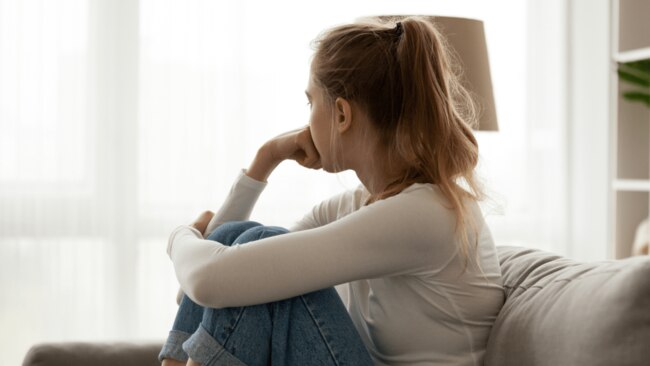Mental health awareness has come a long way, but the stats show we're still in crisis
Make time to check in on your loved ones

Mental Health
Don't miss out on the headlines from Mental Health. Followed categories will be added to My News.
Mental health is now a commonplace topic of conversation, but the stats show Australians are still suffering. Here's why there's still a long way to go.
Over the past few years, almost no topic has been in the spotlight as much as mental health. And it makes sense – our mental wellness is connected to virtually everything we do, be it our jobs, our time spent alone, our friends, our family, our partners.
The past five years in particular have seen mental health skyrocket into the cultural consciousness. Conversations have permeated classrooms, lunch tables and offices, and in a post-pandemic world, we know now more than ever that health really is wealth, which extends to mental wellness too.
But while mental health now sits comfortably at the forefront of our lexicon, the data shows we’re still in crisis.

Like what you see? Sign up to our bodyandsoul.com.au newsletter for more stories like this.
Women are bearing the brunt of the cost-of-living crisis
According to the Liptember Foundation’s 2023 research on mental health, women are feeling the burn of the cost of living crisis.
In fact, 59 per cent of women are suffering from the financial pressure associated with inflation, with one in three women saying they don’t; seek help because they can’t afford it.
Financial stress is listed as a major trigger for depression (35 per cent) and anxiety (36 per cent), whic has grown since the same report was conducted a year earlier.
It’s interesting that financial stress specifically affects women. Perhaps this is a result of the everpresent gender pay gap, which is never felt more than in the midst of a recession.
“It is clear that we have a considerable way to go in removing some of the barriers to seeking help that still prevail,” says Luke Morris, Liptember Foundation CEO and founder.
“Many of these barriers are caused by the ever-present mental health stigma that exists in our society, as well as a lack of sufficient and timely access to mental health resources.
“These statistics highlight the responsibility we all have to eradicate the stigma and make seeking help a non-negotiable for women who are suffering.”

Women’s physical health conditions take a toll on mental wellness too
Not only are women suffering from financial stress, physical health conditions are also taking a toll on the mind.
Women’s biological issues like endometriosis, polycystic ovary syndrome (PCOS), and reproductive issues like struggles with fertility, pregnancy, menopause and vaginismus can impact a woman’s mental health.
Liptember’s report shows that “One in every five women experiencing premenstrual dysphoric disorder (PMDD) is struggling with suicide and self harm, and almost a quarter of women with vaginal issues will have social phobias.” Birth trauma is also linked to instances of post-traumatic stress disorder (PTSD).
“Financial pressures are worsening women’s mental health yet at the same time, a growing number of those who suffer from mental health issues say they can’t afford to seek the help they so desperately need,” says Liptember Foundation mental health advisory panel member and clinical psychologist Madhavi Nawana-Parker.
“This valuable information will help steer Australia towards looking at mental health through a gendered lens and ultimately close the mental health gender gap.”

Men are still struggling to speak out
When it comes to men, the root causes of mental health challenges remain the same – the societal pressure that comes with seeking help, and the lack of resources to ease that.
According to data from Lululemon’s third annual Global Wellbeing Report, 37 per cent of the country’s men feel like the societal status quo makes it harder to express their emotions. 46 per cent believe their communities would frown upon open discussions about their mental health struggles, and 52 per cent think it’s harder for men to speak up about their mental health than women, due to the expectation of toughness.
Men account for 75 per cent of deaths by suicide; a number that could be drastically lessened by making it more socially acceptable to ask for help or openly express their suffering.
Almost half the population will experience a mental health condition at some time in their life, so ensuring there are adequate support resources and that the culture around using them changes is crucial.

Mental health conditions start young
Research also shows that the surge in mental illness isn’t something only affecting adults – and conditions are presenting in teenagers right at the start of high school.
A 2023 Beyond Blue survey found that Australian teachers believe poor mental health is the biggest issue amongst our youth, followed by excessive screen-time, and then bullying, according to the ABC.
The data from Beyond Blue shows half of all mental health conditions start by age 14 and that one in seven young people have experienced a mental health condition in the past 12 months.
Furthermore, one in 10 people between the ages of 12 and 17 will self-harm, while one in 13 will seriously consider suicide. One in 40 will follow through with a suicide attempt.
Social media reportedly plays a large part in this decline in mental health amongst young people, and phone usage has repeatedly been proven to have a drastic affect on mental wellness.

What can we do about the mental health crisis?
Health charities like Movember , R U OK?, Lifeline and Beyond Blue are driving change in the mental health space, raising awareness and generating funds for much-needed crisis support.
But change is needed at a social level, to facilitate the resources for people to seek help; at a cultural level, so people feel more comfortable speaking up; and at a level that permeates law-making, workplaces and family dining tables.
While mental health is far less taboo than it was in the past, there’s a long way to go. And it’s not enough to rely solely on the amazing services being offered by non-profits – the conversations need to change at an interpersonal level, and we still have a long way to go.
Asking people if they are okay, continuing to destigmatise mentions of mental illness, and creating safe spaces for people to open up will save lives. And there's no better time than the present.
Mental health support resources
- Beyond Blue – beyondblue.org.au
- Lifeline – 13 11 14 or lifeline.org.au
- Black Dog Institute – blackdoginstitute.org.au
- Headspace App – headspace.com
- Calm app - calm.com
In an emergency please call 000
If you or someone you know needs help, phone Lifeline on 13 11 14 or the 24- hour
Suicide Call Back Service 1300 659 467.
Mental health professionals are available 24/7 at the beyondblue Support Service –
1300 22 46 36 or via beyondblue.org.au/get-support for online chat (3pm-12am AEST)
or email response.
More Coverage
Originally published as Mental health awareness has come a long way, but the stats show we're still in crisis





